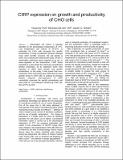| dc.contributor.author | Tan, Hong-Kiat | |
| dc.contributor.author | Yap, Miranda G.S. | |
| dc.contributor.author | Wang, Daniel I.C. | |
| dc.date.accessioned | 2005-12-16T14:36:29Z | |
| dc.date.available | 2005-12-16T14:36:29Z | |
| dc.date.issued | 2006-01 | |
| dc.identifier.uri | http://hdl.handle.net/1721.1/30382 | |
| dc.description.abstract | Mammalian cell culture is typically operated at the physiological temperature of 37°C. Low temperature cell culture at 30-33°C, in particular for CHO cells, increased the specific productivity of many recombinant proteins amongst many other benefits. However, the cell density is lower, thus reducing the total protein yield. Of the 17 mammalian cold-stress genes reported to be up- or down-regulated at low temperature, CIRP shows potential as a gene target for improving recombinant protein production, as its expression levels were reported to affect both growth and specific productivity. In this study, it was shown that over-expression of the cold-stress gene CIRP did not cause growth arrest in CHO cells, in contrast to previous reports. However, over-expression of CIRP successfully improved the specific productivity and total yield of a recombinant interferon-γ CHO cell-line at 37°C by 25%. | en |
| dc.description.sponsorship | Singapore-MIT Alliance (SMA) | en |
| dc.format.extent | 228546 bytes | |
| dc.format.mimetype | application/pdf | |
| dc.language.iso | en | en |
| dc.relation.ispartofseries | Molecular Engineering of Biological and Chemical Systems (MEBCS) | en |
| dc.subject | CIRP | en |
| dc.subject | cold-stress | en |
| dc.subject | Interferon gamma | en |
| dc.subject | productivity | en |
| dc.title | CIRP Expression on Growth and Productivity of CHO Cells | en |
| dc.type | Article | en |
